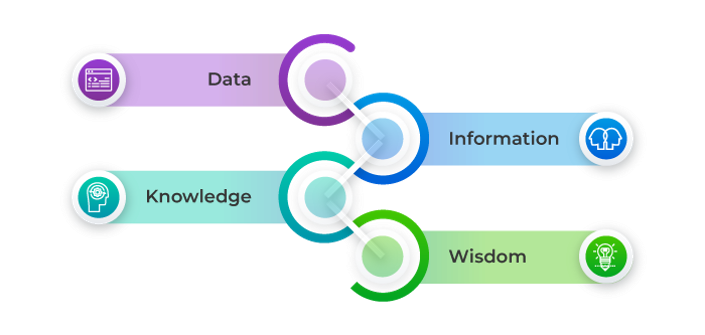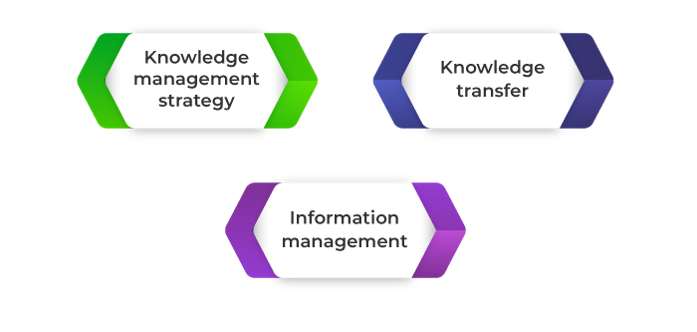
The Service Knowledge Management System (SKMS) is a collection of systems, tools, and databases that are required for knowledge management to be successful. It is the responsibility of Knowledge Management in ITIL to maintain the Service Knowledge Management System, which represents the total body of knowledge within the organization. The main purpose of the knowledge management process in ITIL is to share different ideas, perspectives, experiences, and information. It also has to ensure that these are available at the right place and at the right time in order to allow informed decisions to be made. It helps to improve efficiency by decreasing the necessity to rediscover knowledge.
Basic Concepts of Knowledge Management in ITIL
- Data: It is a set of discrete facts
- Information: It arises from providing context to the data
- Knowledge: It is composed of experience, values, ideas, insights, values, and judgments of an individual
- Wisdom: It makes use of knowledge to create value through correct and well-informed decisions
Objectives of Knowledge Management in ITIL
The following are the objectives of knowledge management:
- To improve the decision-making of the management by ensuring that reliable and secure knowledge, data, and information are available.
- To enable the service provider to increase their efficiency and the quality of the service they provide. It also increases their satisfaction and reduces the cost of service.
- It has to maintain a Service Knowledge Management System (SKMS) which provides controlled access to the required knowledge, information, and data.
- To gather, analyze, store, share, use and maintain knowledge, information, and data throughout the organization of the service provider.
Scope of Knowledge Management in ITIL
Knowledge management is relevant to all lifecycle stages, and hence it is referred to throughout ITIL from the perspective of each publication.
Value of Knowledge Management in ITIL
Implementation of knowledge management practices in the workplace can help to improve the service. The following are the beneficial values of knowledge management:
- Knowledge management reduces the amount of time that needs to be invested in the training of newly hired employees. Through knowledge management practices, the teams will receive accurate and up-to-date information constantly, which results in a smaller number of formal training sessions.
- It reduces the number of errors made by the members of a team. This is because if the team has all the necessary knowledge required to make decisions, they are unlikely to make more mistakes.
- It reduces the need to repeat the steps in the service process. By informing everyone about the process, it is less likely that they will perform a step incorrectly. Knowledge management implementation allows a team to decrease the service process time by removing the need to redo steps.
- Successful management of data, information, and knowledge, delivering conformance to legal and other requirements.
- It provides us with data, information, and knowledge that is up-to-date, complete, and valid.
- Knowledge management provides us with documented requirements for the retention of each category of data, information, and knowledge.
- It allows IT professionals to respond to the needs of the customers quickly and more effectively.
Stages of Knowledge Management in ITIL
There are 4 stages of knowledge management:
1. Data
- The facts available in the database constitute raw data.
- By processing this data, it is converted into usable information.
2. Information
- Data becomes information once it is given context.
- Data is sorted according to type to create information.
- This information is then relayed via means such as documents, email, and formal reports in order to establish the relevant information.
3. Knowledge
- When the members of a team analyze information by taking into consideration their own experiences, it becomes knowledge.
- Personal insights of an individual are responsible for turning information into knowledge.
- This knowledge can be used for making decisions.
4. Wisdom
- The gained knowledge can be put into context in IT service situations.
- The entire team is responsible for using their personal judgment and experience to apply the knowledge in a way so that it becomes wisdom.
Process Activities of Knowledge Management in ITIL
The key activities in the knowledge management process are:
1. Knowledge Management Strategy
- A strategy for identifying the relevant information should be formed by the IT manager.
- Organizations rely on feedback from customers, incident reports, and costs associated with providing and management support systems and translate them into facts to be shared with the team.
- The ideal strategy should identify the types of information to target and process through knowledge management.
2. Knowledge Transfer
- Once the knowledge management strategy is in place, a method has to be devised through which knowledge will be transferred among the members of a team and between departments.
- The initial step is to find out the location of gaps to make sure that knowledge reaches the appropriate people in the organization.
- By taking time to identify gaps, we can identify them.
3. Information Management
- Information can be turned into knowledge only if properly managed and distributed across the whole team.
- Access to information is a vital part of the knowledge management process.
- Information management involves gathering data, managing information, and finding out how this can be turned into knowledge.
- A process must be established to organize information into a procedure and should be recorded in a manual for future usage.
Risks & Challenges of Knowledge Management in ITIL
The challenges in the knowledge management process are:
- A lot of justification would be required for the effort needed to create a consistent architecture for managing the present data, information, and knowledge stores.
- It is challenging to ensure that all stakeholders understand the added value that a holistic approach to knowledge management can bring.
The risks involved in knowledge management are:
- Sometimes, there will be too much focus on the supporting tools rather than on the creation of value.
- There can be an insufficient understanding of the knowledge, information and data required.
- Too much effort put into capturing knowledge can result in insufficient attention to knowledge transfer and re-use.
- Storing of knowledge and information which are outdated and irrelevant.
- A lack of support and commitment from stakeholders.
Conclusion
Knowledge management thus reliable and secure knowledge, data and information are available, thereby improving the overall decision-making capabilities of the organization. It enables the service provider to increase their efficiency and maintains a Service Knowledge Management System (SKMS) which provides controlled access to the required knowledge, information, and data. Also, learn about the various service management skills and best practices with ITIL 4 Foundation training, and gain professional expertise in service management.
Know more about Service Management best practices through Invensis Learning’s IT Service Management certification training on ITIL V4 Training, SIAM Foundation, SIAM professional, VeriSM, etc.

















